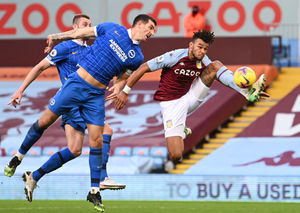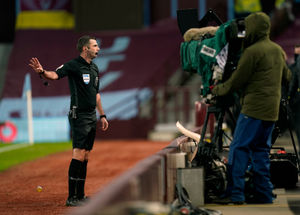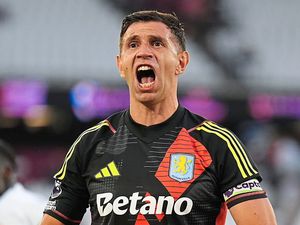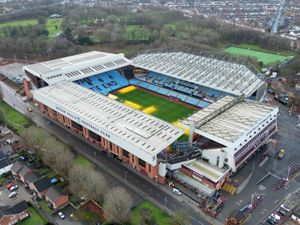Aston Villa analysis: Rollercoaster Villans showing they are a work in progress
Will the real Aston Villa please stand up?
Now eight matches in, the Premier League results logged by Dean Smith’s team still refuse to follow any kind of accepted logic.
Brilliant in victory at Arsenal prior to the international break, they were equally bemusing in defeat against Brighton, putting in a performance which in flashes showed them at their very best and very worst before eventually ending in a third straight home reverse.
It was a loss confirmed in stoppage time by the only thing previously missing from this so far engrossing Villa season – a major VAR controversy.
With seconds remaining, Michael Oliver appeared to have offered Villa a shot at partial redemption when he pointed to the spot after Brighton’s Solly March played the ball but also a portion of the man when attempting to dispossess Trezeguet in the box.
But after a word in his ear from video assistant Chris Kavanagh, the official trotted over to the TV monitor before promptly changing his mind.
Oliver’s about-turn ensured he would feature most prominently in the immediate post-match discussion yet while Smith was clearly left exasperated, along with everyone else, at the continued vagaries of VAR, he was honest enough not to place too much emphasis on the late controversy when listing factors in the defeat.
Befuddling though Villa’s form might appear to casual observers, some trends have begun to emerge.
That includes a failure to take chances at key times which has cost them in home matches against Leeds, Southampton and now Brighton, as Smith was quick to point out on Saturday. Neither has a lack of composure, in all three defeats, only been confined to the opposition box. Seemingly impregnable on the road, where they are still to concede, Villa have now been breached 11 times in their last four home matches.
Brighton’s 12th minute opener on Saturday, meanwhile, will surely rank among the worst goals conceded in the Premier League this season from a defensive point of view, with Villa evoking memories of the shambolic goal gifted by Manchester United to Istanbul Basaksehir in the Champions League earlier this month.
On this occasion it was Danny Welbeck who found himself the furthest man forward, five yards inside his own half, and permitted a clean run at Emiliano Martinez before lifting an impressive lobbed finish over the Villa keeper.
The build-up to Brighton’s winner, after Ezri Konsa had levelled early in the second half, was admittedly neat yet even then the hosts were guilty of leaving March in too much space to fire a shot into the top corner.

From then on Villa looked rather short of ideas before Oliver took centre stage, the referee also brandishing a late red card after the Seagulls’ impressive right-back Tariq Lamptey accrued two soft bookings in quick succession.
Just how much of a surprise the final result was is open to question. There were certainly elements to the build-up which made this appear a trap game for Villa.
Brighton, as their performance proved, are a better outfit than their league position suggests, while the hosts had to contend with what Smith described as a “microwaved” preparation, with several key players not returning from international duty until little more than 24 hours prior to kick-off.
Things then got trickier for Villa after just 50 seconds when Ross Barkley delivered a free-kick and promptly grasped his hamstring, heading down the tunnel soon after having played no further part.
Should a subsequent scan reveal the on-loan Chelsea midfielder requires an extended rest, that will sting Smith more than this defeat.
On Saturday, Barkley’s early exit exposed the lack of strength in depth which may well present the biggest barrier to Villa, dangerous opponent though they clearly are, making a sustained challenge in the top half of the table.
After sending on Bertrand Traore as replacement, there weren’t too many game-changers left sitting behind Smith on the Villa bench.
Conor Hourihane and Anwar El Ghazi were eventually called upon with 15 minutes remaining but neither was able to make a serious impact.
Traore, meanwhile, experienced something of a mixed afternoon and of the club’s five signings in the recent transfer window, it would be fair to say he is the one still to really show what he can do in the league.
There were encouraging moments, one first-half shot bringing a smart save out of Brighton goalkeeper Mat Ryan, while it was Traore’s impressive set piece delivery from which Konsa levelled the scores 70 seconds into the second half.
Yet there were other times when the Burkina Faso international was guilty of picking the wrong option, while he occasionally appeared hesitant in his play.
Mind you, Traore was far from the only Villa player who wasn’t quite on top of his game. Both Tyrone Mings and John McGinn seemed to be feeling the effects of a busy international break, while by the end, even Jack Grealish, though still the home team’s best outlet, was misplacing passes.
The good news for Smith and his players is they now have an extended gap before their next fixture at West Ham a week tonight.

It is still less than four months since Villa travelled to the London Stadium on the final day of last season still needing a result to avoid relegation and the return should provide a reminder of just how much improvement they have made in a short period of time. Away fixtures no longer hold any fears for Smith’s team, who will face the Hammers aiming to extend a 100 per cent record on their travels.
A haul of 15 points from the first eight matches of the campaign still represents an excellent return, even if unpredictable results might appear to make Smith’s team something of an enigma.
Yet the real Villa can also be found in those scorelines.
Clearly much improved on a season ago and capable of beating any team in the division on their day, they are not yet strong enough to grind out a positive result on days when things don’t quite click.
One thing they are certainly not is boring. After a decade when the club was at best an afterthought and often an irrelevance in the big picture of English football, that in itself feels like progress.





